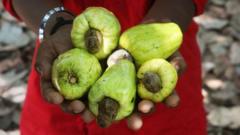Ghana, a leading exporter of unprocessed cashews, grapples with the challenge of maximizing profits from its cashew industry. Despite efforts to increase local processing, issues like high loan costs, infrastructural deficits, and competition from foreign markets persist, leaving farmers and entrepreneurs seeking solutions.
Ghana's Cashew Market: Striving for Higher Value in Tough Times

Ghana's Cashew Market: Striving for Higher Value in Tough Times
Amid the challenges of producing and exporting cashew nuts, Ghana aims to increase domestic processing to boost revenues and local consumption.
Ghana is at a crossroads with its cashew industry, a vital agricultural sector that faces the daunting task of moving from unprocessed exports to higher-value domestic processing. Situated in Accra, I attempt to understand why a small bag of roasted cashew nuts costs far more than their raw counterparts. The stark price disparity reflects the challenges and economics of Ghana’s cashew trade.
As the world’s third-largest exporter of unprocessed cashews, behind only Ivory Coast and Cambodia, Ghana is home to around 300,000 farmers who depend on this crop for their livelihoods. Nashiru Seydou, a farmer from the northeast region of Ghana, shares the difficulties he faces due to unstable prices and inadequate supply chains, stating, "We are struggling. We can use the sunlight, the fertile land, to create more jobs," while urging government support for the industry. Currently, he earns approximately $50 for a 100kg sack of unshelled cashews.
Bright Simons, an economic analyst, highlights the significant markup that occurs within the cashew market. Roasters and retailers purchase unshelled nuts for $500 a tonne, but then resell them for a staggering $20,000 to $40,000 a tonne. Ghana produces roughly 180,000 tonnes of cashews each year, with over 80% exported as raw materials, generating around $300 million in revenues—far less than if Ghana processed and sold roasted nuts locally.
Mildred Akotia, CEO of Akwaaba Fine Foods, is among those pushing for more local processing. Currently processing just 25 tonnes annually, she emphasizes that high interest loans—often around 30%—hinder the growth potential for local enterprises. "We’ve had to rely on what we can get," she reflects on the challenges of securing funding and competing with imports. Surprisingly, many of Ghana's cashews are exported to countries like India and Thailand for roasting, then shipped back to Ghana at prices equivalent to locally produced nuts.
After a failed attempt in 2016 to impose an export ban on raw cashews to promote local processing, Ghana continues to seek ways to support its farmers and local businesses. Discussions around increased tariffs on raw cashew exports have emerged, yet experts like Simons warn of the need for local businesses to develop better marketing and branding strategies to stimulate domestic demand.
Prof. Daron Acemoglu, a Nobel-winning economist, stresses the importance of enhancing access to international markets for processed cashews and addressing infrastructure issues. He argues that building strong local markets is essential for the industry’s survival. Meanwhile, Akotia seeks to streamline logistics and expand her operations to meet growing demand in the UAE and North America, aiming to bolster national pride through the promotion of locally processed foods.
As the cashew market evolves, Ghana finds itself on a path toward transformation, with key players like Akotia striving to capitalize on both local and international opportunities. With new strategies and a commitment to building the local economy, the country aims to crack the tough nut of the cashew industry for greater resilience and growth.






















